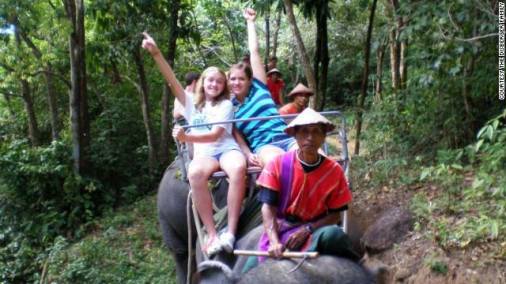Important Travel Information for Those Taking Family Holidays In Thailand
>> Sep 29, 2015
If
you are thinking about booking a family holiday in Thailand, there is some important travel information that you
need to be aware of (particularly if you’ve never been to the country before).
In this article, we have outlined some of this information to help you plan
your holiday accordingly. Even so, we recommend speaking with your travel agent
to ensure you haven’t missed anything.
▪ Culture
The country’s culture has been developed over thousands of years and is strongly influenced by the principles of ancestor worship and Buddhism. You will find that Thailand’s music and dance is a fusion of early customs, religion and modern society – they’re truly a wonder to behold. As religion is important to the people, it is important to be respectful.
The country’s culture has been developed over thousands of years and is strongly influenced by the principles of ancestor worship and Buddhism. You will find that Thailand’s music and dance is a fusion of early customs, religion and modern society – they’re truly a wonder to behold. As religion is important to the people, it is important to be respectful.
▪ Currency
The currency of Thailand is the baht, which is divided into 100 satang. A baht is worth a little over 3 cents Australian; a typical meal will cost you around 150 baht (or about 5 cents Australian). Coins range from 1 satang to 10 baht and notes range from 20 baht to 1000 baht. It is generally recommend that you exchange before you arrive.
The currency of Thailand is the baht, which is divided into 100 satang. A baht is worth a little over 3 cents Australian; a typical meal will cost you around 150 baht (or about 5 cents Australian). Coins range from 1 satang to 10 baht and notes range from 20 baht to 1000 baht. It is generally recommend that you exchange before you arrive.
▪ Customs
Keep in mind that it is considered rude to wear revealing clothing, to show anger or impatience, to blow your nose or lick your fingers whilst eating, to point (particularly with your feet), and to touch a Thai person (particular on the head). The customary greeting is to bow the head whilst placing your hands together and raising them.
Keep in mind that it is considered rude to wear revealing clothing, to show anger or impatience, to blow your nose or lick your fingers whilst eating, to point (particularly with your feet), and to touch a Thai person (particular on the head). The customary greeting is to bow the head whilst placing your hands together and raising them.
▪ Language
Whilst Thai is the official language, there are different local dialects and several other languages also spoken (such as Chinese, Malay, Lao and English). English is taught in schools, but fluent speakers will be few and far between. Fortunately, the people are very friendly and willing to help with translations whenever possible.
Whilst Thai is the official language, there are different local dialects and several other languages also spoken (such as Chinese, Malay, Lao and English). English is taught in schools, but fluent speakers will be few and far between. Fortunately, the people are very friendly and willing to help with translations whenever possible.
▪ Transportation
The most popular way to get around the country is by taxi – metered taxis are generally cheaper than those offering a set rate. The most iconic way to get around, however, is by tuk tuk. Note that they charge higher rates and will often detour to particular shops in order to earn commission (you can request the driver take you directly to your destination).
The most popular way to get around the country is by taxi – metered taxis are generally cheaper than those offering a set rate. The most iconic way to get around, however, is by tuk tuk. Note that they charge higher rates and will often detour to particular shops in order to earn commission (you can request the driver take you directly to your destination).
▪ Visas
Travellers with a current Australian passport that is valid for at least 6 months can take family holidays in Thailand for up to 30 days without a visa. Australian visitors entering from a neighbouring country can stay for up to 15 days without a visa. If you want to stay longer, intend to work or are travelling for reasons other than tourism, you need a visa.
Travellers with a current Australian passport that is valid for at least 6 months can take family holidays in Thailand for up to 30 days without a visa. Australian visitors entering from a neighbouring country can stay for up to 15 days without a visa. If you want to stay longer, intend to work or are travelling for reasons other than tourism, you need a visa.
We
hope that the travel information provided here has reassured you that your
family holiday in Thailand will go off without a hitch. If there is anything
that you are still unsure about, ensure that you speak to your travel agent, to
someone who has previously holidayed in Thailand or do some online research –
it is important that you are comfortable with your decision.













0 komentar:
Post a Comment